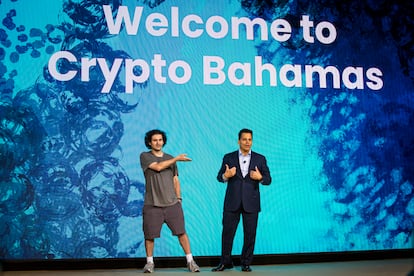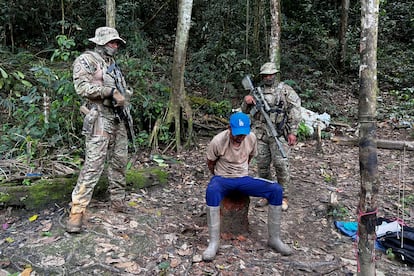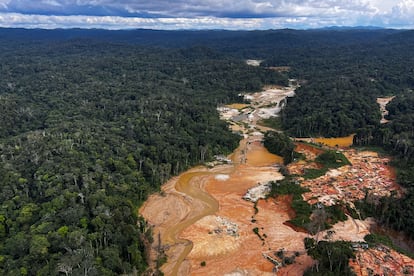Financial crimes steal more than $3 trillion from the global economy
The planet faces tax havens, environmental crimes, corruption and cyberattacks, which continue to grow. The consequences of these activities are enormous: they increase inequality and cost people their lives


The annual cost of financial crimes and tax evasion comes to a total of up to $3.5 trillion annually.
Cut to October 2023. It’s the fifth day of the fraud trial of Sam Bankman-Fried, the founder of FTX. Through a high-risk fund, the system he and his team put together swindled more than $14 billion from their clients.
“When you worked at Alameda [Research], did you commit any crimes?” the prosecutor asked Caroline Ellison.
“Yes, I did,” she replied. “[Bankman-Fried] forced me to commit those crimes.”
Ellison, 28, is Bankman-Fried’s former lover and partner. When they were dating, he was 31 and she was CEO of the Alameda Research hedge fund. They lived together in a mansion in the Bahamas, until the lie collapsed. Today, Bankman-Fried is fighting a sentence of 110 years in prison.
Youth, cryptocurrencies and greed are three key parts of modern economic crises. Despite a certain level of improved regulations, tax havens continue to operate. Meanwhile, cyberattacks — according to the Center for Strategic and International Studies — cost the world $945 billion a year. Financial institutions allocate around $214 billion annually to protect themselves as a result. The investment bank Goldman Sachs warns of how “tremendously destructive” a digital attack could be on the electrical grid of the Northeastern United States. Some 15 states would be left in darkness, while the price of this luminous Armageddon would range between $250 billion to $1 trillion in damages. Despite the official story, artificial intelligence (AI) is extremely fragile.
Human beings are, too. Corruption costs Latin America an astounding $200 billion annually. A 2017 survey from Transparency International interviewed 164,000 people around the world. About 25% claimed to have paid bribes in the previous year — something that’s responsible for about half of the global economic slowdown. Meanwhile, circumventing ethics and committing environmental crimes — such as illegal logging or mining, the third-largest type of criminal activity on the planet — generate $281 billion a year in profits. There’s a widespread idea that these crimes are “low risk, high return.”
The amount of money that has left sub-Saharan Africa illicitly since 1980 exceeds $1.3 trillion. This scarcity engenders greater poverty, more illegal immigration, environmental degradation, fewer external resources, reduced confidence in financial institutions, and increased inequality. The geopolitics of making the poor more miserable carries the risk of spreading anger across the continent.
The great beneficiary of this situation (along with Russia) is China. The Asian giant is the largest lender to nations on the African content (although Beijing never reveals the amount of debt) and, without a doubt, is the biggest external power in the region.
Around the planet, crime is rising and the “bad guys” are ahead when it comes to cutting-edge technology. Financial institutions are the main target and geopolitics has become a process of extracting money, creating misery and jeopardizing the future.
As a result of the fraudulent and the unfair, Europe — according to Mark Bou, head of communications at the Tax Justice Network — loses $181 billion in taxes annually, because billionaires and large companies use them to pay less than they should. This is equivalent to almost 12% of public health spending in European nations. “A multi-billion-dollar industry has emerged in the world, employing some of the best-educated people as lawyers, consultants, accountants, with the sole purpose of evading taxes for the rich and the unscrupulous. And, yes, additionally, certain successful entrepreneurs avoid paying,” Daron Acemoğlu reflects. He’s professor of economics at MIT and a recurring candidate for a Nobel Prize. “Tax havens are particularly useful for people who have misbegotten wealth, due to bribery, embezzlement and manipulation. It’s a big problem.” The dark soul of abused talent. He warns: “[It’s] clearer than ever, with the Russian invasion of Ukraine, that these financial crimes are also costing lives.”
Few seem to care. The United Kingdom, the Netherlands, Luxembourg, Ireland and Switzerland enable some of the biggest tax abuses on the planet. Europe as a whole is responsible for the loss of $236 billion annually in taxes, according to the Tax Justice Network. “In the Old Continent, in recent years, a growing flow of money of illicit origin from Russia and Malta has been detected,” reveals Enric Olcina, a partner at FS Consulting and head of Financial Crimes at KPMG in Spain. “Avoiding taxes is a permanent temptation. It’s inevitable and the reality is that [companies and millionaires] go where they pay less,” affirms jurist Antonio Garrigues Walker.
“It’s a problem without a solution. There will always be jurisdictions that offer tax incentives,” shrugs Mauro Guillén, vice dean of the Wharton School at the University of Pennsylvania.
The pessimism of the philosopher Emil Cioran (1911-1995) remains: “It’s not the violent evils that mark us, but the dull evils, the insistent, the tolerable ones, those that are part of our routine and meticulously undermine us, just like the time.”
In 2021, more than 140 countries and territories agreed to apply a minimum tax of 15% on the profits of multinationals. This “historic milestone” — as it was described at the time — is, today, thanks to legal loopholes, actually around 9%. “The financial crimes that cause the most damage to our states and societies are generated because they’re legal. The laws are written by the economic criminals’ own lawyers, or created so that their accountants can dance around them,” Yanis Varoufakis criticizes. He’s the former Greek finance minister, who stood down the German government during the 2015 sovereign debt crisis in his country.
In the EU, there are 30 special tax regimes that benefit 262,999 people with a tax cost of $7.5 billion euros ($8.2 billion) annually. The effective tax rate for billionaires in France is close to 0%. In the United States, it’s around 0.5%. A global 2% rate on the assets of these “lucky ones” (2,757 people, according to data published by the EU Tax Observatory in December 2022) would raise $214 billion. While it’s fiscally legal to wake up in a tax haven, perhaps a moral bridge is required to get over the greed. This is according to Mauro Guillén and Garrigues Walker. “Financial crimes limit the resources available to promote social development, such as [in the fields of] education and health,” warns Luis Ayala, a professor of economics at Spain’s National University of Distance Education. Crime makes the globe go round.
The National Crime Agency (NCA) estimates that there are at least 59,000 people in the U.K. involved in organized crime — including financial crimes — and the cost to the country is more than £47 billion ($59 billion) per year. Without these funds, generations are lost in precariousness, while money is wasted on drugs or luxuries. “Financial crimes have a devastating effect on economies and negatively contribute to the creation of differences between different social groups, since they’re linked to obtaining wealth through illicit activities. In many cases, [these activities] have a price in human lives, [because of] human-trafficking or drug-trafficking,” observes Manuel Delgado, a partner at EY.

Europe has always privileged regulation over a laissez faire system. The Financial Action Task Force (FATF) and the more recently-created Anti-Money Laundering Authority (AMLA) are Brussels’ containment dams. For this reason, financial institutions allocate $214 billion a year to protect themselves. “The reputational impact [that] an accusation of money laundering [has on] a bank is devastating. They’re very aware and are very careful with the clients they accept from territories considered to be tax havens or that have a bad reputation,” warns José García Montalvo, professor of Applied Economics at Barcelona’s Pompeu Fabra University (UPF). The 2015 closure, due to its illicit activities, of the Banca Privada de Andorra (BPA) is still vivid in his memory. Banco Madrid also disappeared. Coincidentally, the Madrid-based entity had its headquarters in Margaret Thatcher Square. The British prime minister — who, during her tenure from 1979 until 1990, deregulated the financial markets — pushed policies that contributed to the 2008-2009 financial crisis. Ironically, despite the increase in financial crimes, the scrutiny is greater.
“Pig butchering”
The term “pig butchering” comes from China. It refers to the practice of gradually stuffing the animal (“fattening the pig”) before taking it to the slaughterhouse. In pig butchering scams, victims are pampered for quite some time. Upon being seduced (the targets are usually men), the scammers control their victims’ money through investments in cryptocurrencies, which at first offer great returns. However, later on, the beautiful financial advisor disappears with the funds into the deepest part of the internet. “The key is financial education: it’s the pillar of this decade,” explains Fernando de Rojas, a professor of economics at the Carlos III University in Madrid.
However, beyond the monetary damage, financial crimes affect human dignity. “This is as big a scandal as any of the financial scandals that we’ve seen in the last 20 years,” says Graham Barrow, an anti-money laundering expert. “It is an abject failure by the U.K. government to have done nothing about it.” It all started in China back in 2019, but it’s now making its way through Europe and the United States, where the FBI has already received complaints worth around $429 million.
Young people have — without a doubt — been attracted to the phenomenon of digital currencies. Cryptocurrencies such as Bitcoin have three key purposes: to diversify savings portfolios (the United States has approved exchange-traded funds, or ETFs, amid this exchange of intangible currencies), to preserve capital in countries with corrupt governments (which often seize tangible assets) and to facilitate illicit activities. They make up the blackjack of financial capitalism. “Criminals won’t give up on the misuse of cryptocurrencies anytime soon,” predicts Jean-Philippe Lecouffe, deputy executive director of Operations at Europol.
Cheating has become so banal that they even dare to do so with JP Morgan Chase. Charlie Javice — an entrepreneur — created a startup called Frank, which she described as the “Amazon of higher education.” The platform helped students find funding for their degrees. On LinkedIn, she wrote that her platform had more than five million students and about 6,000 universities. The future was so bright that JP Morgan bought the company in 2021 for $175 million. But everything turned out to be false: Frank barely had 300,000 clients. Javice, 31, had (allegedly) hired a data scientist to fatten the numbers.
JP Morgan has 240,000 employees. The investment bank’s CEO earns $34.5 million a year for his expertise. Was everyone too busy to pay attention? Meanwhile, Javice denies the charges that have been levied against her. She’s facing up to 30 years in prison if convicted.
Artificial intelligence
American executives should have been in front of their computers learning the latest information about AI or machine learning technology when this hoax occurred. The consulting firm McKinsey reports that “the techniques used to discover tax evasion are becoming more complex every day.” Big banks have invested $214 billion annually to protect themselves. American consulting firms trust in new technology: they feed their models with data about money laundering, illicit trafficking and terrorist financing, so that the technology learns to detect them. The red light flashes in real time. “Logically, if you’re able to design algorithms that prevent a good part of financial crimes, you’ll be helping to avoid them,” Enrique Dans confirms. He’s professor of innovation at the IE Business School in Madrid.
The big problem, however, lies within human beings. “We were, by nature, children of wrath, like the rest of mankind.” Ephesians 2:3. This tension haunts man more than 2,000 years later. According to data from the U.N., Latin America and the Caribbean account for half of the intentional homicides in the world, despite only representing 8% of the global population. The murder rate has increased in Central America and the Caribbean by 4% in the last two decades. And poor countries like Jamaica or El Salvador must allocate 2% of their wealth to combat crime. Loss of life results in a loss of prosperity. In Latin America, an increase in the homicide rate by 30% means a reduction in GDP growth by 0.14 percentage points. If the region had the same homicide rate as the global average, GDP would increase by 0.5% annually.

Dirty businesses that destroy nature
Financial crimes aren’t merely digital numbers traversing complex networks. The destruction of land and ecosystems is one of the most profitable “businesses” on the planet. Environmental crimes generated between $110 and $281 billion in criminal profits in 2021, according to the Financial Action Task Force (FATF). Illegal logging alone resulted in profits of $152 billion. And this represents much more than illicit money: it subtracts social and economic development, negatively impacts health and the environment, all while reducing the security of communities. Corruption is also encouraged, due to the links between illegal extractive industries with drug-trafficking and forced labor.
This dirty money takes advantage of financial secrecy laws, which criminals use to hide their identities, facilitate operations and launder the proceeds of crime. Investigations by the InSight Crime platform suggest that the problem is even greater, as the drug-trafficking and money-laundering networks grow in Brazil, Colombia, Peru and Ecuador.
To the north, in Mexico — in the Sierra Madre Occidental, the mountains in the state of Chihuahua — the Tarahumara (or Rarámuri) Indigenous group has been inhabiting the territory for 15,000 years. But they have a problem: the area has become one of the main logging areas in the country, with drug-traffickers cutting down thousands of trees.
Without this forest, the sheep — the Tarahumara’s means of existence — will disappear. The women weave blankets out of their wool to protect their families from the freezing temperatures that descend over the mountains in winter. This material also provides for mortuary shrouds.
“They have stolen their arewá (soul),” laments Sofía Mariscal, who, through the Marso Foundation, tries to protect the dignity of the locals. “They want to take everything / Leave my land with nothing / My family suffers from hunger / My forest suffers from logging,” sing the Raprámuri, against a future of cement. “Seizing illicit funds and physical assets related to deforestation isn’t just about punishing criminals and demonstrating that ‘justice is done,’" says Juhani Grossmann, director of the Green Corruption program at the Basel Institute on Governance (Switzerland). “It’s also essential to prevent future deforestation, since by doing so, you prevent funds from being reinvested in this activity.”
Without the oxygen provided by the Amazon, the planet becomes a chronically ill person unable to exhale. Of the more than 300 operations carried out by the Brazilian Federal Police to combat environmental crimes in the Amazon — according to Melina Risso, research director of the Igarapé Institute — 30% involved fraud, 64% involved the bribing of officials and 61% involved money-laundering. The crime was based on four elements: illicit agriculture, the invasion of publicly-owned lands, illegal logging and clandestine mining.
With gold exceeding $2,000 per ounce (28.34 grams), the temptation of illegal exploitation has become irresistible in several Latin American countries. “Its nature — and the way it’s refined — make it very easy to hide the fact that it’s been illegally extracted,” Grossmann warns. Minerals critical for the green transition have also entered the picture. When state-owned companies participate, the risk of corruption increases, with more politicians and fewer justified expenses. “Nothing is in vain and that’s why I migrate / I also flee because I’m in danger / This is my soil, this is my air / And I don’t understand why they separate me / From that greed that invades them.” More verses against inequality from the Rarámuri people.
Daron Acemoğlu, MIT economist: “You find inequality in tax havens and the crimes they engender”
Daron Acemoğlu, from MIT, is spending his summer vacation in Turkey, his homeland. He walks through Istanbul — the city where he was born, in 1967 — and notes that inflation is around 65%. Concerns about the economy are discussed in cafés and shops.
Acemoğlu is very sensitive to injustice. “One of the main failures of our era is that new technologies, globalization and integration increased productivity and generated economic growth (although not as much as some experts predicted), but [the gains] haven’t been shared. Inequality has increased. What’s more serious is that hundreds of millions of people have been left behind,” he reflects.
“Many believe the game is ‘rigged.’ Elites and technocrats have reorganized the economy [in a way that] has been biased against [the general public]. This belief is at the root of authoritarian populist parties and leaders. It has reduced support for democracy across Europe.”
It’s certainly not a nonsensical thought, especially when you think of an isolated town in Wisconsin, or the prostitutes who walk Figueroa Street in Los Angeles. “Conspiratorial thinking is fanciful,” Acemoğlu sighs, “but many inequalities have been created by flawed policies and legal loopholes. [The technocracy] has also ignored the situation of the less educated and hasn’t done much to address inequality and inequalities. There’s no better place to see this than in dozens of tax havens around the world and the financial crimes they engender.” These havens are reserved for the few, while they represent a descent into hell for millions of other human beings.
Sign up for our weekly newsletter to get more English-language news coverage from EL PAÍS USA Edition
Tu suscripción se está usando en otro dispositivo
¿Quieres añadir otro usuario a tu suscripción?
Si continúas leyendo en este dispositivo, no se podrá leer en el otro.
FlechaTu suscripción se está usando en otro dispositivo y solo puedes acceder a EL PAÍS desde un dispositivo a la vez.
Si quieres compartir tu cuenta, cambia tu suscripción a la modalidad Premium, así podrás añadir otro usuario. Cada uno accederá con su propia cuenta de email, lo que os permitirá personalizar vuestra experiencia en EL PAÍS.
¿Tienes una suscripción de empresa? Accede aquí para contratar más cuentas.
En el caso de no saber quién está usando tu cuenta, te recomendamos cambiar tu contraseña aquí.
Si decides continuar compartiendo tu cuenta, este mensaje se mostrará en tu dispositivo y en el de la otra persona que está usando tu cuenta de forma indefinida, afectando a tu experiencia de lectura. Puedes consultar aquí los términos y condiciones de la suscripción digital.








































